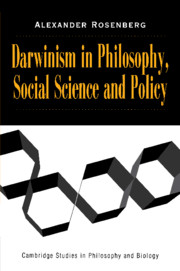Book contents
- Frontmatter
- Contents
- Introduction
- 1 A Field Guide to Recent Species of Naturalism
- 2 Naturalistic Epistemology for Eliminative Materialists
- 3 Limits to Biological Knowledge
- 4 Reductionism Redux: Computing the Embryo
- 5 What Happens to Genetics When Holism Runs Amok?
- 6 The Biological Justification of Ethics: A Best-Case Scenario
- 7 Moral Realism and Social Science
- 8 Contractarianism and the “Trolley” Problem
- 9 Does Evolutionary Theory Give Comfort or Inspiration to Economics?
- 10 The Political Philosophy of Biological Endowments: Some Considerations
- 11 Research Tactics and Economic Strategies: The Case of the Human Genome Project
- Bibliography
- Index
6 - The Biological Justification of Ethics: A Best-Case Scenario
Published online by Cambridge University Press: 06 July 2010
- Frontmatter
- Contents
- Introduction
- 1 A Field Guide to Recent Species of Naturalism
- 2 Naturalistic Epistemology for Eliminative Materialists
- 3 Limits to Biological Knowledge
- 4 Reductionism Redux: Computing the Embryo
- 5 What Happens to Genetics When Holism Runs Amok?
- 6 The Biological Justification of Ethics: A Best-Case Scenario
- 7 Moral Realism and Social Science
- 8 Contractarianism and the “Trolley” Problem
- 9 Does Evolutionary Theory Give Comfort or Inspiration to Economics?
- 10 The Political Philosophy of Biological Endowments: Some Considerations
- 11 Research Tactics and Economic Strategies: The Case of the Human Genome Project
- Bibliography
- Index
Summary
Social and behavioral scientists – that is, students of human nature – nowadays hardly ever use the term “human nature.” This reticence reflects both a becoming modesty about the aims of their disciplines and a healthy skepticism about whether there is any one thing really worthy of the label “human nature.”
For some feature of humankind to be identified as accounting for our “nature,” it would have to reflect some property both distinctive of our species and systematically influential enough to explain some very important aspect of our behavior. Compare: molecular structure gives the essence or the nature of water just because it explains most of its salient properties. Few students of the human sciences currently hold that there is just one or a small number of such features that can explain our actions and/or our institutions. And even among those who do, there is reluctance to label their theories as claims about “human nature.”
Among anthropologists and sociologists, the label seems too universal and indiscriminant to be useful. The idea that there is a single underlying character that might explain similarities threatens the differences among people and cultures that these social scientists seek to uncover. Even economists, who have explicitly attempted to parlay rational choice theory into an account of all human behavior, do not claim that the maximization of transitive preferences is ‘human nature’.
I think part of the reason that social scientists are reluctant to use “human nature” is that the term has traditionally labeled a theory with normative implications as well as descriptive ones.
- Type
- Chapter
- Information
- Darwinism in Philosophy, Social Science and Policy , pp. 118 - 136Publisher: Cambridge University PressPrint publication year: 2000
- 1
- Cited by



